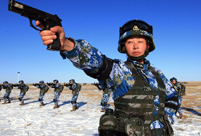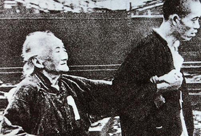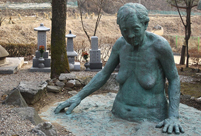 Fighters of Lanzhou MAC in confrontation training
Fighters of Lanzhou MAC in confrontation training
 3D printing to trigger third industrial revolution
3D printing to trigger third industrial revolution
 Top 10 brands that win rich women's hearts
Top 10 brands that win rich women's hearts
 Deng Xiaoping: 'I have a clear conscience all my life'
Deng Xiaoping: 'I have a clear conscience all my life'
 Xi Jinping: 'The people are our strength'
Xi Jinping: 'The people are our strength'
 Amazing cliff diving in cold winter
Amazing cliff diving in cold winter
 Enjoy Sochi 2014 in slow motion
Enjoy Sochi 2014 in slow motion
 University student sentenced to death for poisoning roommate
University student sentenced to death for poisoning roommate
 Chinese lunar New Year celebrated in San Francisco
Chinese lunar New Year celebrated in San Francisco
The Great Hall of the People, the very center of the state, witnessed two silent tributes this week from China's most powerful people to victims of a shocking terrorist attack.
On Wednesday morning, at the opening meeting of the annual session of the National People's Congress (NPC), China's legislature, around 3,000 deputies lowered their heads and stood in silence for a minute for the dead in the killing spree at a railway station in the southwestern city of Kunming.
Last time the NPC paid silent tribute at its annual session was in March 1997 for Deng Xiaoping, the prominent Chinese leader who passed away in February of the same year.
Two days earlier, a similar ritual was observed at the opening meeting of the annual session of the National Committee of the Chinese People's Political Consultative Conference, the country's top political advisory body.
Party and State leaders Xi Jinping, Li Keqiang, Zhang Dejiang, Yu Zhengsheng, Liu Yunshan, Wang Qishan and Zhang Gaoli attended both rituals.
The Kunming attack struck Chinese society hard due to its brutal nature, as knife-wielding assailants indiscriminately attacked the civilians, causing 29 deaths and injuring another 143.
There are many ways to react to such a horrible incident.
Hours after the attack, President Xi Jinping ordered law enforcement agencies to crack the case and "firmly suppress terrorists' rampant momentum."
From the public, legislators, and political advisors to foreign governments and international organizations, people denounced the terrorist attack.
But sometimes silence is the loudest.
Kunming residents placed flowers and lit candles in front of the bronze bull statue at the station square, where the attack was believed to have started.
The quiet and spontaneous mourning at the scene and silent tributes in the Great Hall of the People were not simply a ritual. They were moments for reflection and moments for seeking solidarity and strength.
In 2008, Chinese people observed a national mourning day for victims in the devastating earthquake in Sichuan Province, the country's first such occasion for ordinary citizens.
Two years later, when a strong earthquake hit Yushu in Qinghai Province, government departments and all Chinese embassies abroad lowered national flags to half-staff for mourning just as they do for state leaders.
Behind such respect to life of ordinary people is the Chinese government's people-oriented governance approach, a gradual, but visible, change in recent years.
In his debut speech as general secretary of the Communist Party of China Central Committee in November 2012, Xi Jinping told media "to meet their (the people's) desire for a happy life is our mission."
As for China's fight against terrorism, those moments of silence may endow it with more strength.
 Chaihe village, pure and peaceful fairyland in snow
Chaihe village, pure and peaceful fairyland in snow Belgians warmly welcome arrival of China's giant pandas
Belgians warmly welcome arrival of China's giant pandas Female marines receive tactical training in NW China
Female marines receive tactical training in NW China Blood memory: Nanjing Massacre in 1937
Blood memory: Nanjing Massacre in 1937 Top 10 pure beauties in showbiz
Top 10 pure beauties in showbiz British WWII veteran: I can't forgive Japan
British WWII veteran: I can't forgive Japan Tongban's dream of prosperity
Tongban's dream of prosperity Chinese frigate Yancheng holds drills in Mediterranean Sea
Chinese frigate Yancheng holds drills in Mediterranean Sea A visit to comfort woman's home in South Korea
A visit to comfort woman's home in South Korea Fairyland? Qingdao in sea of clouds
Fairyland? Qingdao in sea of clouds Top 10 most handsome faces in Asia in 2013
Top 10 most handsome faces in Asia in 2013 Female celebs with beautiful long legs
Female celebs with beautiful long legs Cat 'guardians' in Forbidden City
Cat 'guardians' in Forbidden City Large numbers of ancient coins excavated in Inner Mongolia
Large numbers of ancient coins excavated in Inner Mongolia Leisurely life beneath Zhonggulou, where time travels slower
Leisurely life beneath Zhonggulou, where time travels slowerDay|Week|Month